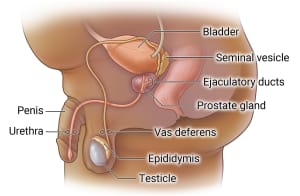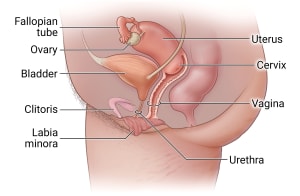Cystic Fibrosis and the Reproductive System
How does CF affect the reproductive system?


Children with cystic fibrosis (CF) have a problem with how the cell protein CFTR (cystic fibrosis transmembrane conductance regulator) works. CFTR controls the flow of water and certain salts in and out of the body's cells. As the movement of salt and water in and out of cells is altered, mucus becomes thickened.
In the reproductive system, the thickened secretions can cause blockages. These can affect how the sex organs develop and work.
Gender words are used here to talk about anatomy and health risk. Please use this information in a way that works best for you and your provider as you talk about your care.
For most men with CF, the tube (vas deferens) that carries sperm to the penis does not develop. This is called congenital bilateral absence of the vas deferens (CBAVD). In men with CBAVD, even though the vas deferens is missing, the sperm are not. In fact, 90% of men with CF and CBAVD have normal sperm production. This means that most men with CF can conceive biological children through assisted reproductive techniques (ART). A reproductive specialist (urologist) can use tests to find out a person's reproductive status.
Women also have an increase in thick cervical mucus. This may make it harder for them to get pregnant. ART can help such women as well. Cystic fibrosis, however, doesn't affect sex drive or performance in either women or men. The physiological changes in pregnancy may make CF symptoms worse. People with CF must talk with their healthcare provider before planning to get pregnant.
Symptoms that may happen due to CF’s effects on the reproductive system include:
Delayed sexual development
Menstrual periods stop for a few months or completely stop
Irregular periods
Inflammation of the cervix
Infertility or sterility
With newer treatment strategies, people with CF are living longer and healthier lives. Many now can think about having children.
Talk with your CF healthcare team if you are thinking about parenting or having a baby.
Connect with us:
Download our App: